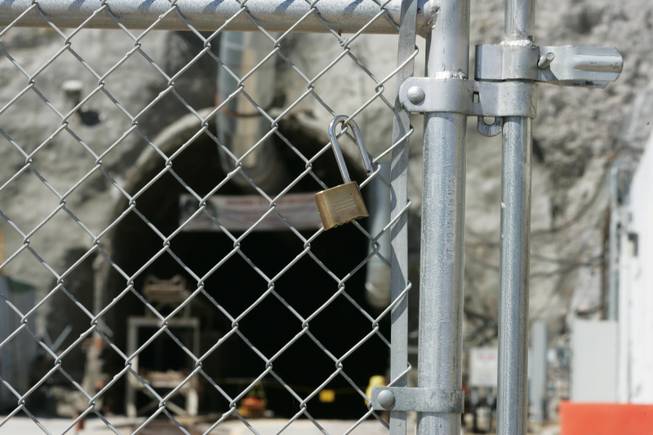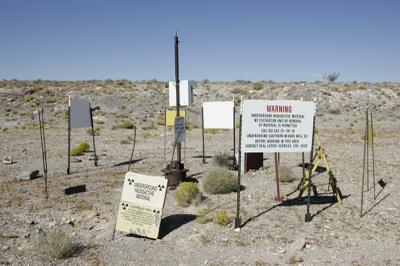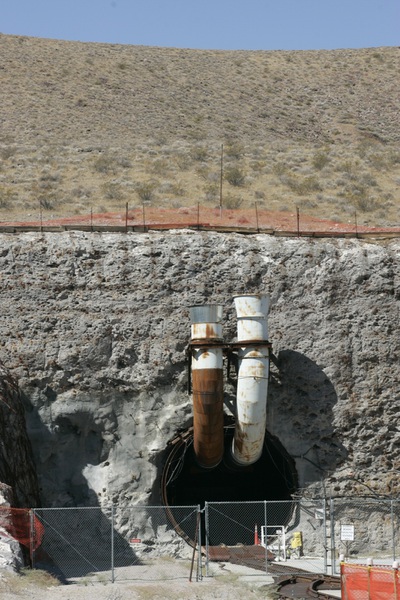
Chain-link gates block the portals to Yucca Mountain, although this one at the north portal has an open padlock during a recent visit. About 1,600 people work at the site, mostly scientists testing to see whether the site is viable and safe for waste storage.
Monday, Oct. 13, 2008 | 2 a.m.
Reader poll
Sun Archives
Today, the Yucca Mountain project is a horseshoe-shaped tunnel under 1,000 feet of an unimpressive peak in Southern Nevada.
It’s 60 miles as the crow flies to the lowest point in the continental United States, Badwater in Death Valley National Park. From Yucca’s ridge it is also possible to see the highest point in the continental United States, Mt. Whitney, as well as ancient volcanoes and a major fault line.
Chain-link gates bar entrances to the tunnel.
Since Senate Majority Leader Harry Reid led Democrats in cutting funding for the project again and again, the workforce at the mountain has dipped to 1,600, down from 2,750. Yucca Mountain Project workers seldom go into the tunnel, which has giant ventilation systems snaking from its depths.
The workers are geologists and hydrologists and other scientists performing tests to help the Energy Department prove Yucca will work and be safe.
With the Nuclear Regulatory Commission’s decision this summer to begin considering the department’s application for a license to open Yucca for business, the project may well be back on track for approval.
Unless the next president intervenes.
Democratic nominee Barack Obama opposes the project and has said he will withdraw the Energy Department license application.
Republican nominee John McCain supports the project if it is safe and environmentally sound.
Those positions seem clear enough. But in reality, the future of the project will remain uncertain regardless of who is elected.
If McCain wins
If McCain argues, as President Bush does now, that scientific and environmental issues can be dealt with, Yucca may have a clear path through the administration at its most crucial moment: while the NRC is considering the license.
But the license and the project itself would by no means be guaranteed. State and congressional opponents will continue the tactics that have drawn out the process for two decades.
Bob Loux, former executive director of Nevada’s opposition organization, the Nuclear Projects Agency, says even if the Nuclear Regulatory Commission approves the license application in four years, as long as Democrats retain control of Congress, construction will never begin at Yucca.
“Budget stalling — that’s their best strategy,” said Eric Herzik, chairman of the political science department at the University of Nevada, Reno, and an avid follower of the Yucca debate. “Stall until someone gives up.”
One other point: McCain said in a Las Vegas interview during the campaign that he opposes shipping the waste through Phoenix, in his home state of Arizona.
The McCain camp has said the comment was taken out of context or was made in confusion. McCain appears not have understood the question. Nevertheless, environmental groups have seized on the gaffe.
Campaign spokesman Rick Gorka explains that McCain “doesn’t want it transported through any cities if it’s not safe. It doesn’t matter if it’s Phoenix or Las Vegas, if it’s not safe ... he doesn’t support it,” he said. “He doesn’t want to put any community at risk.”
If Obama wins
Herzik questions how much of a priority killing Yucca would be for a freshly minted Obama administration, because the issue doesn’t register with national audiences. Herzik said that although Obama has been clear that he opposes Yucca and has said that he would shut down the project, it is less clear how quickly or thoroughly that will happen.
Obama’s Nevada spokeswoman, Kirsten Searer, says the issue would rank high with the candidate.
“He understands how dangerous this would be, for nuclear waste to be transported and stored in Nevada,” she said. “It’s something he would take a look at as soon as he’s in office.”
Obama’s concern is safety, especially in the transportation of waste from nuclear sites across the country, Searer said. Transporting nuclear waste long distances to the mountain over outdated rail lines and roads would be too dangerous, she said.
If Obama does yank the license application, the project will wither but not necessarily die. That’s because the congressional act that requires the government to pursue a nuclear waste repository at Yucca remains in place, no matter who is president and whom he appoints as secretary of energy, said Allen Benson, an Energy Department official.
As Herzik explained, the secretary of energy “could pull the plug, zero out the budget. But Congress does have the ultimate say because the Nuclear Waste Policy acts of 1982 and 1987 designate siting of a repository specifically at Yucca Mountain.”
If Democrats are successful in widening their majority in Congress, amending or repealing the Nuclear Waste Policy Act might be possible.
If the act remains in place and years from now Republicans win control of Congress, Yucca could be resurrected.
“It would be interesting if President Obama were to say, ‘I’m canceling this,’ and if members of Congress said, ‘Wait a minute. This is our law.’ Then you’re back in court,” Herzik said.



Join the Discussion:
Check this out for a full explanation of our conversion to the LiveFyre commenting system and instructions on how to sign up for an account.
Full comments policy